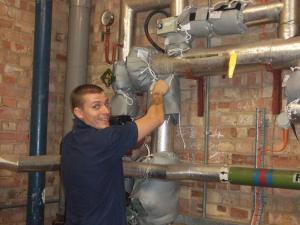- Group home
- You must register/login in order to post into this group.
CIBSE Low Carbon Performance Awards Campaign

By: Medway NHS Foundation Trust
Organised by CIBSE, the Chartered Institution of Building Services Engineers, the low carbon performance awards aim to recognise and reward achievements in delivering carbon savings in buildings. Originally entered into the “100 Hours of Carbon Clean Up” category, the scale of our campaign resulted in us being entered into the‘Low Carbon Operator / Manager of the Year’ category instead. Our efforts won us first prize. The campaign was managed by the hospital’s Environmental Manager and Technical Engineer Environmental and was driven by the Energy and Sustainability Steering Group, which consists of members from high level management. Backing also came from the hospital’s chairman. The awareness and communications of the campaign was assisted by more than 40 Energy Champions who are volunteers from various departments on site. A major part of this carbon-saving drive involved the installation of mechanical and electrical measures in order to reduce our carbon footprint. A big area tackled in this was lighting. For instance 200 low energy-lamps were installed in the nurses’ on-site accommodation block (saving £2,575 annually) and 600 dimmable low-energy lamps were fitted above patient beds. Enhanced PIR lighting zone controls with daylight sensors were placed in the hospital’s main restaurant, and low energy lights and controls installed in our Post Graduate Centre reception. Time delay light switches were installed on a trail basis in a variety of store rooms and cleaners’ cupboards, the intention is to use these across the Trust in the future. Other mechanical and electrical initiates included the use of insulated covers for heating valves and pipe work in many locations. Three new Hydrovar inverters were fitted to our soft water pumping system too, reducing pump frequency from 50Hz to 37Hz. New reverse osmosis equipment in the main boiler house was installed in order to produce purer water for the steam boilers. This will significantly improve efficiency, reduce chemical consumption and cut the number of times the boilers have to be “blown down” to reduce dissolvable solids. A key part of the campaign was to review all aspects of staff induction and training methods, and also to enhance the effectiveness of the Energy Champions. The champions were regularly updated on the progress of the campaign and at a meeting, also attended by the Chairman, were challenged to come up with new ideas to cut carbon emissions in all areas of the Trust and also to recruit new champions. As a result of the meeting it was decided to design badges for the champions so that their colleagues will know who they are, making it easier for staff to acquire carbon reduction advice both at home and at work. Global emails and internal and external websites were used to communicate campaign progress and a ‘greenmail’ system was used to enable all 3,500 members of staff to contact the energy team for advice. The campaign also included improving the awareness of climate change issues to children attending the onsite nursery. They learnt about polar bears and how their habitat is being affected by climate change.
